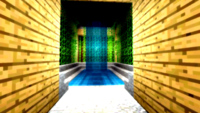Temple of the Arriving Satyr King: Difference between revisions
Newzimiagov (talk | contribs) |
Newzimiagov (talk | contribs) |
||
| Line 29: | Line 29: | ||
===The Chapel=== | ===The Chapel=== | ||
The Chapel is the temple's central place of worship. Sermons are held regularly here, as are secretive bacchanals and rites of passage which the general public is prohibited from attending. The chapel is defined by several rows of stone pews, and by a central altar at the head of the chamber upon which a rests a candle between two potted [wikipedia: | The Chapel is the temple's central place of worship. Sermons are held regularly here, as are secretive bacchanals and rites of passage which the general public is prohibited from attending. The chapel is defined by several rows of stone pews, and by a central altar at the head of the chamber upon which a rests a candle between two potted [[wikipedia:Amanita muscaria|Amanita muscaria]] mushrooms. The arrangement of the candle and mushrooms calls to mind a phallus, where the mushrooms represent two testicles, and the mushroom represents the shaft of the penis. | ||
===The Library and Residential Area=== | ===The Library and Residential Area=== | ||
Revision as of 02:17, 10 April 2019

The Temple of the Arriving Satyr King is a famous Bassarid temple located outside of a village near the city of Agripinilla. The Temple is best known for its gigantic statue of a satyr, that features a large erect penis from which is emitted a tremendous waterfall.
The Statue of the Arriving Satyr King
The Statue of the Arriving Satyr King is a colossal statue of Silenus, the king of the satyrs, who serves as the protector and mentor of Dionysus. The statue, which stands at around 100 ft high, and which is distinguished by a large erect phallus which emits a tremendous waterfall, stands atop a small ziggurat-type foundation that is itself constructed atop the ceiling of the Congregation Garden, the main hall of the subterranean Temple of the Arriving Satyr King. The eyes of the statue are illuminated by two, constantly burning torches, as are the upward facing palms of the statue which extend outwards along side the statue's erect phallus, and the corners of the ziggurat upon which the statue is built. Vines grow from the statue's chin, as well as from its genitals, creating the impression of a great beard, and radiant pubic hair. Between the statue's legs are several steps upon which are featured potted poppy flowers. Around the base of the statue is a small seating area fashioned as a type of amphitheater, where Bassarid religious practitioners gather to pay homage to Silenus and Dionysus. Offerings to the god and his mentor may be placed on the various levels of statue's base. Owing to its scale and religious significance, the statue of the Arriving Satyr King is regarded as one of the modern wonders of the eastern world.
Temple Exterior
The Temple of the Arriving Satyr King was constructed in an underground cavern along a creek near Agripinilla, which flows directly into the Strait of Haifa. The temple, with this said, is completely encased in dirt and stone. The only feature of the temple which is visible from the surface is the large front window of the Congregation Garden. The entrance to the temple is concealed by a waterfall known as Pollen Falls. In order to enter the temple, visitors must pass through the purifying waters of Pollen Falls, causing them to be completely drenched. Once inside the temple, visitors are provided with towels to dry off, and a spare set of clothes which they must wear throughout the duration of their visit.
Temple Interior
Entrance Tunnel
The Entrance Tunnel is a long, stone tunnel, which leads from the temple entrance to the Changing Chamber. There is no lighting in the Entrance Tunnel, meaning that visitors to the temple must pass - while still completely drenched from Pollen Falls - through near-complete darkness as they enter the temple. The darkness of the tunnel symbolically represents the period after death, and before re-birth.
Changing Chamber
The Changing Chamber is the first chamber which visitors reach after passing through the pitch-black Entrance Tunnel. The walls of the Changing Chamber are lined with two sets of shelves. On one shelf, visitors leave their clothes which have been drenched by Pollen Falls. On the other, they receive the clothes which they are expected to wear throughout the duration of their visit to the temple.
Congregating Garden

The Congregating Garden is the main hall of the Temple of the Arriving Satyr King. This area is defined by a large, well-maintained garden which stretches through the center of the entire hall. On one end of the garden is an oak tree, above which hang vines that extend downwards from the base of the Statue of the Arriving Satyr King. On either side of the garden are rows of stone benches, where visitors to the temple may sit as they wait to be received by the temple's resident monks and nuns. The Congregating Garden is also used by the various Mylecia-based commercial cults to their host wild, often violent bacchanals.
The Garden Stream
The Garden Stream is an artificial waterway which separates the Congregating Garden from the other temple's other chambers. A walkway is constructed over the Garden Stream in two locations - between the Congregating Garden and the Bath House, and between the garden and the Cathedral. As visitors cross these walkways they are expected to meditate upon the complexities of life, or to offer a prayer for the eternal blessings of the divinities of the Bassarid religion.
The Bath House
The Bath House is a communal bathing area in which visitors to the temple may relax and clean themselves while mingling with other visitors, as well as the temple's monks and nuns. The walls of the Bath House are draped with vines which extend downwards from the roof. The base of the walls is lined with rows of poppy flowers.

The Chapel
The Chapel is the temple's central place of worship. Sermons are held regularly here, as are secretive bacchanals and rites of passage which the general public is prohibited from attending. The chapel is defined by several rows of stone pews, and by a central altar at the head of the chamber upon which a rests a candle between two potted Amanita muscaria mushrooms. The arrangement of the candle and mushrooms calls to mind a phallus, where the mushrooms represent two testicles, and the mushroom represents the shaft of the penis.
The Library and Residential Area
